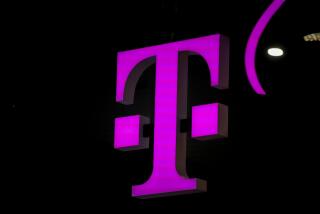AT&T; to acquire Leap Wireless in $1.2-billion deal
- Share via
Seeking a foothold in the competitive prepaid wireless market, AT&T; Inc. has agreed to acquire Leap Wireless International Inc. in a deal valued at about $1.2 billion.
AT&T;, the nation’s second-largest wireless carrier, had been rumored to be in talks with San Diego-based Leap since last year. The purchase is the latest acquisition in an industry that has seen major changes in recent months.
Leap, through its Cricket subsidiary, has roughly 5 million subscribers nationwide. It offers low-cost, no-contract prepaid wireless plans and cellphones.
Under the terms of the agreement, AT&T; will pay $15 a share in cash and will acquire all of Leap’s stock and wireless properties including licenses, network assets and retail stores.
Dallas-based AT&T; said it would retain Leap’s Cricket brand name, provide Cricket customers with access to its 4G LTE network and expand Cricket’s presence to more U.S. cities.
The combined company “will have the financial resources, scale and spectrum to better compete with other major national providers” for customers interested in low-cost prepaid service, AT&T; said. It said consumers could also expect better device choices and improved customer service.
About 96 million people in 35 U.S. states are within Leap’s network coverage area. It currently operates a 3G CDMA network and a 4G LTE network. Leap has 3,400 employees, and as of April 15 it had $2.8 billion in net debt.
Owners of roughly 29.8% of Leap’s outstanding shares have entered into an agreement to vote in favor of the deal, AT&T; said. It expects the transaction, which is subject to review by the Federal Communications Commission and the Department of Justice, to close in six to nine months.
The deal was announced after the markets closed. In after-hours trading, AT&T;’s stock was little changed. Leap’s shares, which closed the day at $7.98, more than doubled after hours to $17.35.
The deal marks the latest development in the fast-changing wireless industry.
In May, T-Mobile USA announced that it had completed its acquisition of smaller rival MetroPCS. The companies said merging the No. 4 and No. 5 players in the industry would create a stronger carrier focused on value.
Meanwhile, Japanese telecom giant SoftBank Corp. last month got shareholder approval for its $21.6-billion acquisition of a majority stake in Sprint Nextel Corp. This week, Sprint overhauled its pricing and launched the “Sprint Unlimited Guarantee,” promising customers on certain rate plans unlimited talk, text and data on the Sprint network for the life of the line of service.
Many analysts expected AT&T; to look for another acquisition target after a planned buyout of T-Mobile in 2011 fell through. That deal was scrapped after running into opposition from government agencies that said it would create a less competitive wireless industry and potentially lead to higher prices for consumers.
The deal was quickly criticized by Public Knowledge, a public interest group in Washington, D.C.
“AT&T; already has more wireless capacity than it needs to serve its customers, and it should focus on using what it has rather than continuing to try to buy out competitors,” said Harold Feld, the group’s senior vice president. “The wireless marketplace does not need more mergers and more concentration.”
Twitter: @byandreachang
More to Read
Inside the business of entertainment
The Wide Shot brings you news, analysis and insights on everything from streaming wars to production — and what it all means for the future.
You may occasionally receive promotional content from the Los Angeles Times.










